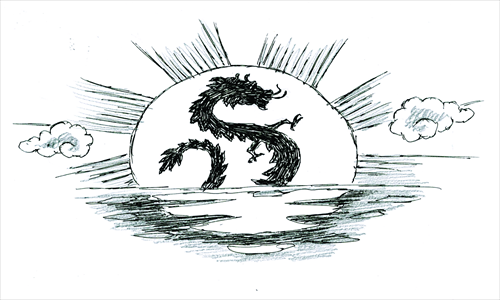Revival of China’s civilization gives legitimacy to its rise

In recent years, the troubles China has met in terms of its diplomacy seem to come from the US' high-profile pivot to Asia and the fact that neighboring countries have not adapted to China's rise. However, the real reason comes from their doubts about China's rise.
Why should China rise? How can China rise? Even the Chinese people have not pondered over these fundamental questions.
I got four answers when I asked my students. Some responded by saying that China is seeking to regain the prosperity that it had in history. In 1820, China's GDP made up 32.4 percent of the world's total, while it only takes up 10 percent now.
Then I asked, if China's GDP takes up one-third of the world's total, what will give legitimacy to China's further rise? And how does one measure China's rejuvenation? If we have to look back to the Han Dynasty (206BC-220AD) or the Tang Dynasty (618-907) when China's development was at its peak, should we resume the imperial tribute system? Will China's neighboring countries allow that to happen? The students had nothing to say.
Others said China's rise means surpassing the US, as China has no reason to endure the US being the world's No.1.
I asked, if in the near future, China's GDP exceeds that of the US, should China continue to develop? Will China's GDP per capita reach the US level? Even if this is the case, what about the environment, housing and healthcare system? The world cannot afford to have another US. In addition, China is an inland country and its traditional development mode is farming-oriented. Can it replace the US hegemony? The students failed to respond.
The third answer was that development is China's right as its GDP per capita only ranks 90th in the world.
However, should China continue its development if China's GDP per capita reaches the world's average level? What will be its next aim?
The final answer I got is that China is aiming to build a harmonious world that boosts long-term peace and joint prosperity, and a world led by the West is unfair and unsustainable.
I asked, are Russia and India not developing peacefully? Isn't Iran also aiming to build a harmonious world? What level of development should China reach so as to help the world achieve harmony?
Since the First Opium War (1840-42), the interaction between China and the world has gone through three stages.
In the first stage, China was forced to merge with the world. Then it actively opened its doors to the world. Now it is at the third stage, when China and the world are influencing and adapting to each other. This is the most important part, as the West needs to be rebuilt and China should rethink its identity.
From my perspective, discovering the universal values embedded in traditional Chinese civilization and allowing the country to integrate into the world is the mission of China's rise.
In fact, China's system and values are increasingly moving toward universal characteristics. The new international economic order proposed by China after the financial crisis has some universal values.
China's way of handling climate change also shows the Chinese people's energy-saving and emission-reducing lifestyle and their concept of the harmonious development between man and nature. The China model is enriching the notion of universal values.
Reviewing other countries' rise in modern history, it came either from a power shift within the West itself or competition aimed at Westernization. It is China's rise that transcends these historical modes.
The rise of China as a civilized country is its biggest advantage in terms of identity. It is incongruous to explain the legitimacy of China's rule in the context of Western-style democracy and human rights. It is also wrong to explain China's strategy of peaceful rise by using the so-called international relations theory.
The socialist path with Chinese characteristics, in terms of China's internal development, is the revival of Chinese civilization. It is also a great creation in the history of human civilization and an experiment in the ruling of a country in the era of globalization. This is where the legitimacy of China's rise lies.
The author is a special term professor at the Renmin University of China. opinion@globaltimes.com.cn